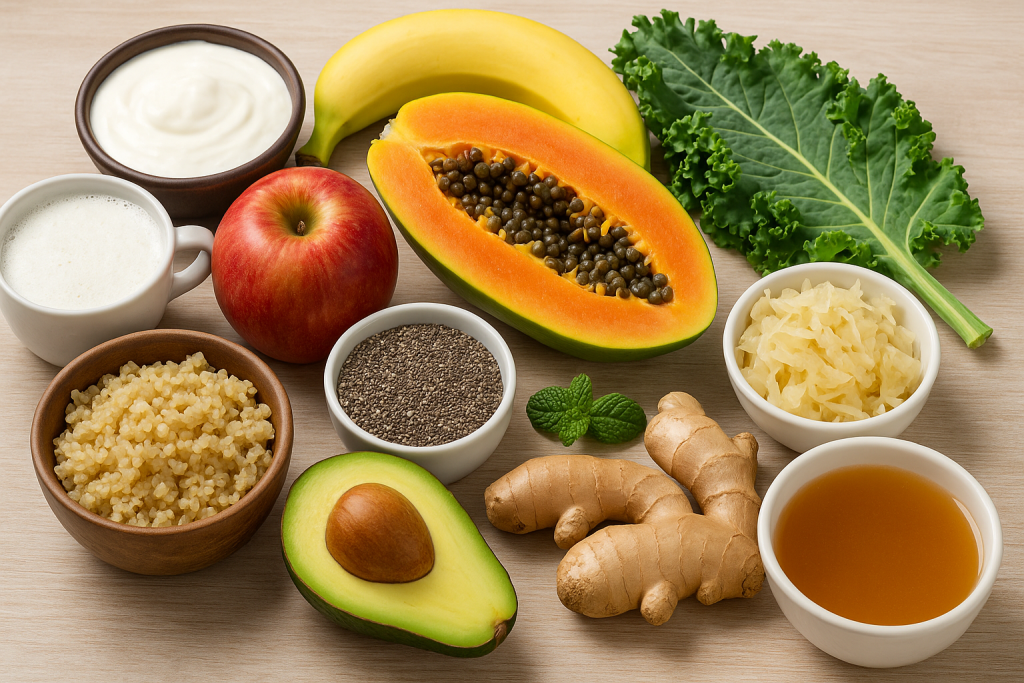
Why Digestion Matters More Than You Think
You’ve probably heard the saying, “You are what you eat.” But more accurately, you are what you digest.
Even if you’re eating the healthiest foods in the world, poor digestion can prevent your body from absorbing nutrients properly, leading to bloating, fatigue, and discomfort.
The good news? You can improve your digestive health simply by choosing the right foods. In this guide, we’ll explore the best foods for digestion—delicious, natural options that keep your gut happy and your body energized.
The Gut: Your Second Brain
Before diving into the food list, let’s take a moment to understand how important your digestive system really is.
Your gut is home to trillions of bacteria (known as the gut microbiome) that not only help you break down food, but also:
- Support immune function
- Influence mood and mental health
- Regulate hormones and inflammation
Feeding your gut the right foods fuels these beneficial bacteria and promotes smoother digestion.
1. Yogurt: The Probiotic Powerhouse
If you’re looking for a food that actively promotes good digestion, yogurt is at the top of the list.
🦠 Why it works: Yogurt is rich in probiotics, live bacteria that help balance your gut microbiome. These good bacteria aid in breaking down lactose and fiber, reducing bloating and gas.
✅ Pro tip: Choose plain, unsweetened Greek yogurt with “live and active cultures” for maximum benefits.
2. Kefir: The Fermented Gut Healer
Often described as “drinkable yogurt,” kefir is a fermented dairy product that contains even more probiotics than yogurt.
🧪 Why it’s great: Kefir not only improves digestion but may also help reduce inflammation in the gut. It’s especially helpful for people with mild lactose intolerance.
✅ Try this: Blend kefir into a smoothie with berries and bananas for a gut-friendly breakfast or snack.
Follow our social media to get an daily update!
3. Ginger: Nature’s Digestive Aid
Used for centuries in traditional medicine, ginger is a natural remedy for nausea, gas, and bloating.
🌿 What makes it special: Ginger stimulates saliva, bile, and gastric enzymes—all of which support efficient digestion.
✅ How to use: Sip on ginger tea after meals, add fresh ginger to stir-fries, or blend it into juices.
4. Papaya: The Tropical Enzyme Booster
This sweet tropical fruit isn’t just delicious—it’s packed with papain, an enzyme that helps your body break down proteins.
🍍 Digestive benefits: Papaya soothes the stomach and reduces symptoms of indigestion and constipation.
✅ Enjoy it: Eat it fresh, add to fruit salads, or freeze it into popsicles for a refreshing treat.
5. Whole Grains: Fiber-Rich Fuel
Whole grains like oats, brown rice, and quinoa are full of insoluble fiber, which adds bulk to your stool and helps food pass through the digestive tract smoothly.
🌾 Why fiber matters: A high-fiber diet prevents constipation, supports healthy gut bacteria, and regulates blood sugar levels.
✅ Eat more: Start your day with oatmeal, choose brown rice over white, or add cooked quinoa to salads.
6. Leafy Greens: A Fiber and Nutrient Combo
Spinach, kale, arugula, and other leafy greens are not only rich in fiber, but they also contain magnesium, which helps the muscles of your digestive tract function properly.
🌿 Added bonus: Leafy greens support healthy bowel movements and help maintain a balanced gut microbiome.
✅ Add to meals: Toss greens into smoothies, salads, sandwiches, or soups.
7. Chia Seeds: Tiny but Mighty
Don’t underestimate these little seeds! Chia seeds are high in soluble fiber, which forms a gel-like consistency in your gut and acts as a natural stool softener.
🌱 Why it’s great: They help prevent constipation and promote regularity.
✅ Eat them: Soak chia seeds in almond milk to make pudding, mix into oatmeal, or sprinkle on yogurt.
8. Bananas: Gentle on the Gut
Bananas are easy to digest and help restore normal bowel function, especially when you’re experiencing diarrhea.
🍌 What they do: Bananas contain pectin, a soluble fiber that helps normalize bowel movements and feeds good bacteria.
✅ How to enjoy: Eat ripe bananas as a snack, mash into toast, or blend into smoothies.
9. Bone Broth: Gut-Soothing Superfood
Made by simmering animal bones and connective tissue for hours, bone broth is rich in gelatin, amino acids, and collagen.
🍲 Why it helps: These nutrients support the integrity of your gut lining and reduce inflammation, which is crucial for proper digestion.
✅ How to use: Sip it on its own, use it as a soup base, or cook grains in bone broth instead of water.
10. Apples: An Easy Everyday Choice
Apples are rich in pectin (just like bananas) and polyphenols, plant compounds that feed beneficial bacteria.
🍎 Digestive benefit: Pectin acts as a prebiotic, which helps grow healthy gut bacteria and supports smooth digestion.
✅ Best tip: Eat apples with the skin on to get the most fiber.
Honorable Mentions
- Fennel seeds – Relax digestive muscles and relieve bloating
- Avocados – Rich in fiber and healthy fats that lubricate the intestines
- Sauerkraut & kimchi – Fermented vegetables that deliver gut-boosting probiotics
- Beets – Increase bile flow, supporting liver and digestive health
What to Avoid for Better Digestion
Just as some foods help your gut, others can hurt it. If you struggle with digestion, try limiting:
- Fried or greasy foods
- Excessive caffeine or alcohol
- Artificial sweeteners
- Highly processed foods with low fiber
Even healthy digestion starts with smart food choices.
How to Build a Digestion-Friendly Plate
To create a gut-friendly meal, aim for balance and variety:
✅ Include:
- A source of soluble and insoluble fiber (like whole grains + veggies)
- A small serving of fermented or probiotic-rich food (yogurt, kimchi)
- Healthy fats (avocado, olive oil) to help absorb nutrients
- Plenty of water to aid fiber movement
Avoid large, heavy meals late at night, and be mindful of portion sizes.
Lifestyle Tips to Support Your Digestive System
While food plays a major role, your habits also matter.
🧘♂️ Slow down when eating – Chew thoroughly and eat mindfully
🚶♀️ Stay active – Gentle movement like walking after meals helps digestion
💧 Hydrate well – Water helps break down food and absorb nutrients
😴 Get enough sleep – Poor sleep can throw off your gut balance
Final Thoughts
Digestive health isn’t just about avoiding discomfort—it’s the foundation for energy, immunity, and long-term wellness.
By filling your plate with foods for digestion like yogurt, leafy greens, ginger, bananas, and chia seeds, you’re not only nourishing your body but also empowering your gut to function at its best.
Start small: add one or two of these foods to your meals each day and pay attention to how your body responds. Over time, you’ll find yourself feeling lighter, more energized, and in sync with your gut.



